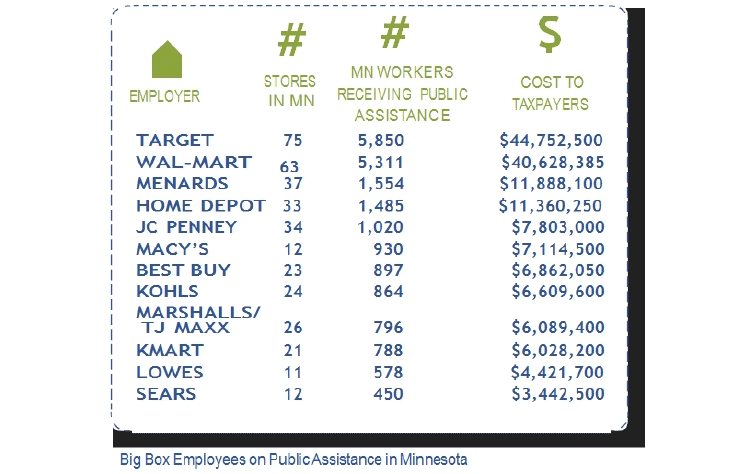

Share
Minnesotans for a Fair Economy released a report highlighting the role of Big Box stores in opposing minimum wage increases at both the state and federal level.
The report, titled “Big Boxes, Small Paychecks — How the Retail Lobby Blocks Increases in the Minimum Wage,” shows how retail trade associations portray their members as small mom and pop businesses, when in reality some of the biggest corporations in the country are the most influential members of these associations.
Workers and allies were joined by Rep. Ryan Winkler and Sen. Patricia Torres Ray and spoke about the personal struggle of surviving on poverty wages while working at wealthy corporations. They wondered what was holding up an increase in the minimum wage, which polls have repeatedly shown garners strong support across the state.
“We are concerned that while Minnesotans have clearly voiced their desire to see an increase in our minimum wage, there seems to be something holding back our legislators,” said the Rev. Paul Slack, president of Isaiah and Pastor of New Creation Church. “We see from this report the power and money behind those opposing an increase, but hope our legislators will side with the majority of Minnesotans who understand it is time to raise the wage and index it to inflation.”
The Retailers Association opposes raising the state minimum wage above the federal amount. Last year it fought against both the House bill to raise the wage to $9.50 and the Senate version to raise it to $7.75. This year, with an increase seeming imminent, the Association has been lobbying for a longer phase-in period and against indexing future wage increases to inflation.
“My rent goes up every year, as do the cost of groceries, but the Minnesota minimum wage hasn’t gone up in nine years,” said Enrique Barcenas, a member of the worker center CTUL who works for Prestige Maintenance USA cleaning a Target store. “It is impossible to support yourself and a family on the current minimum wage. Some of the CEOs of organizations who sit on the board of the Retailers Association have seen their salaries go up by over 200% over the last few years, yet they are opposing hundreds of thousands of workers like myself getting a modest raise and allowing it to go up each year alongside the cost of basic goods.”
Although Target and Walmart maintain they have not taken a position on increasing the minimum wage, their political contributions and leadership in trade associations make it clear they oppose raising the minimum wage at either the federal or state level. Key findings from the report are:
• Target executives have made 65% of all contributions to the Minnesota Retailers Association’s PAC since 2000.
• The Association’s board includes lobbyists from other Big Box stores, such as Walmart, Home Depot, Sears, JC Penney, and Macys in addition to Target. Best Buy’s lobbyist chairs the group’s legislative committee.
• Target executives, their family members, and the company’s PAC have been the largest source of campaign funds for Rep. John Kline, who led the opposition to a bill the US House of Representatives rejected last year to raise the federal minimum wage to $10.10. Since 2005, they have contributed $125,000 to Kline, more than to any other current member of congress.
The report also examines the poverty wages that the retail industry pays its workers, such as cashiers who are paid an average hourly wage of $8.51 at Walmart and $8.10 at Target.
According to the report, the combination of poverty wages and no benefits means that many of the families of retail workers must rely on taxpayer-funded safety net programs. The report estimates that over 20,000 Big Box department store employees in Minnesota are enrolled in a public assistance program for themselves or family members, at a cost of over $150 million a year to taxpayers.
You can read the full report here.

